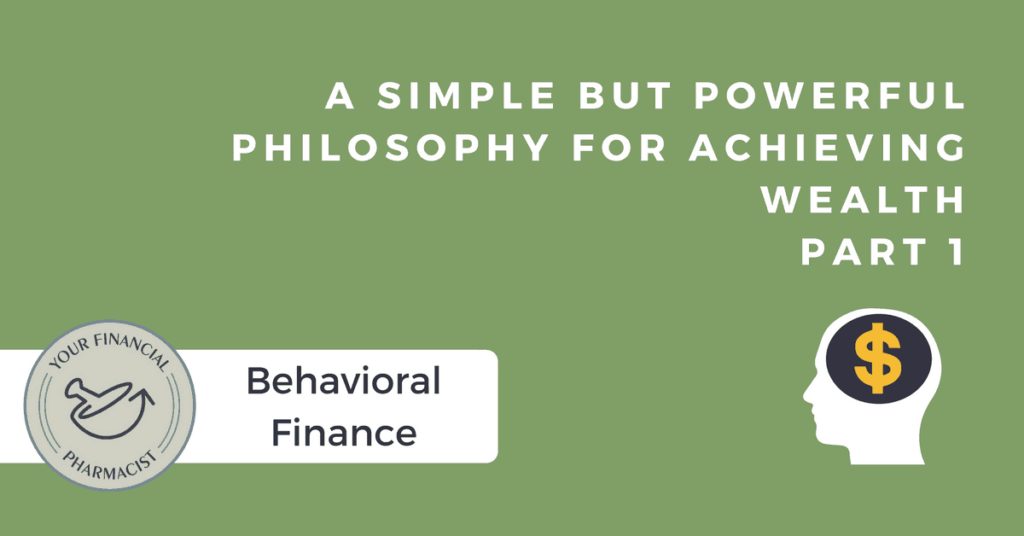The following post was written by Tim Church, PharmD, BCACP, CDE. This is the first in a 3-part series about developing a net worth mindset.
Tim Church is a clinical pharmacy specialist in primary care at the West Palm Beach VA Medical Center and is the author of When Eating Right Isn’t Enough: The Top 5 Medications to Control Your Type 2 Diabetes.
As many of you already know, Tim is my co-author on Seven Figure Pharmacist: How to Maximize Your Income, Eliminate Debt and Create Wealth.
A Ramsey Solutions Master Financial Coach, Tim is passionate about helping people with their finances. You can follow him on Twitter @TimChurch85.
I’m pumped to announce that Tim Church will be joining the Your Financial Pharmacist team! You will be hearing a lot more from Tim on this blog as well as on the podcast and other exciting initiatives we have coming during the second half of 2017 and into 2018.
When I made the commitment to answer yes to one simple question, my financial picture changed and improved dramatically.
I went from feeling frustrated, overwhelmed, and uncertain about my finances to having a sense of relief and clarity. It helped me pay off my car 3 years before the term of the loan was up and has allowed me to live without car payments for over 4 years. It’s what set the stage for my wife and I to pay off $200,000 of student loan debt in only 2.5 years.
Have you ever wondered if you’re on the right track with your finances? While this whole money thing can seem complicated and confusing, the reality is that it’s quite simple. To be successful, you just need to be able to answer yes to one question. If you can answer yes to this one question then you’re on your way to not only achieving financial freedom but also some serious wealth.
Ok enough suspense.
The Question…
Do the majority of your financial decisions promote or grow your net worth?
If you answered yes, then you have a net worth mindset!
Net Worth
People often associate things like income, homes, cars, or clothes with their own or someone else’s financial state. Many pharmacists have the perception that their income alone qualifies them as “doing well” financially. However, income and visible assets only depict part of your financial picture, and unfortunately, in many cases, actually portray an illusion of wealth.
A good indicator of your overall financial health is your net worth, which is defined as:
Total value of your assets (things you own) minus your liabilities (things you owe).
Assets include anything of value such as savings, investment accounts, and real estate. Liabilities include credit card debt, car loans, student loans, or the amount owed on a mortgage.
A Net Worth Mindset
What is the lens through which your decisions with money are made? Is it one that’s completely focused on experiencing instant gratification or one that promotes attaining wealth? Having a net worth mindset means you are keeping your net worth in focus when making most of your financial decisions. It means your financial decisions are either helping you acquire and grow assets or crush debt.
How to Know if You Have This Mindset
On the surface, it may seem subjective whether or not most of your financial decisions are promoting your net worth. Answering yes to these two questions can objectively confirm a net worth mindset:
- Is your net worth increasing every year or trending up over time?
- Is the percentage of your yearly income spent growing your net worth more than the percentage you spend on nonessential expenses (e.g. clothes, eating out, vacations)?
The first question should be fairly easy to answer with some quick calculations. If you need a little help, Personal Capital is a great app that can help you determine your net worth and determine how it changes over time by consolidating all of your financial information.
You may argue that things you can’t control like the stock or housing market will affect the value of your assets thereby affecting your net worth. While that’s certainly true, more importantly is how much money you are putting toward saving/investing or paying off debt.
Question #2 may seem like an incredibly daunting task to determine. The good news is that you don’t need to go through all your bank transactions to get the answer.
One of the best things my wife and I did to better manage our finances is categorize all of our purchases with the help of the Mint app. By doing this consistently, the app is able to breakdown your spending for any time period. Seeing this breakdown over a month will give you an idea, but looking at a year or multiple years really illuminates your spending habits. From that breakdown you can easily determine the percentage of spending that promotes your net worth. Of note, if you have money that is taken directly from your employer and going to a retirement account such a 401(k) then you would need to add this into the calculation as well.
What a Net Worth Mindset is Not
I’m not suggesting that a net worth mindset means you have to only eat rice or Ramen noodles, shop exclusively at thrift stores, and never go on a vacation your whole life. I’m not suggesting it means you should just hoard money. That would be incredibly depressing and potentially detrimental to your health. Living an enjoyable life where you spend a portion of your money on food and entertainment in addition to your financial future can co-exist with a net worth mindset. That’s why the question asks if the majority not all of your financial decisions promote your net worth.
Based on how I described a net worth mindset, you could argue that it’s best to focus entirely on building assets (placing less emphasis on debt elimination). Although that’s one strategy, I truly believe getting rid of non-mortgage debt as quickly as possible is the fastest way to free up money and build wealth. Always remember that paying off debt will effectively increase your net worth.
In Part 2 of this series on net worth, you will learn the common barriers to having and maintaining a net worth mindset.
In the meantime, answer the following question by commenting below:
What is the one thing you can do that will help promote a net worth mindset?
Join the YFP Community!
Recent Posts
[pt_view id=”f651872qnv”]










0 thoughts on “A Simple But Powerful Philosophy for Achieving Wealth (Part 1)”
I believe you have to consistently remind yourself of the overall goal. Long-term goals takes time and discipline. Currently I have to remind myself that the goal is to pay off student loans with large payments above the current payment plan. Freeing up available funds in the future instead of paying more in student loan interest will ultimately increase my net worth.
You’re absolutely right Jordan! Part 3 of this series talks about that and how important it is to have goals that are bigger than your daily desires. Keep crushing your student loans!